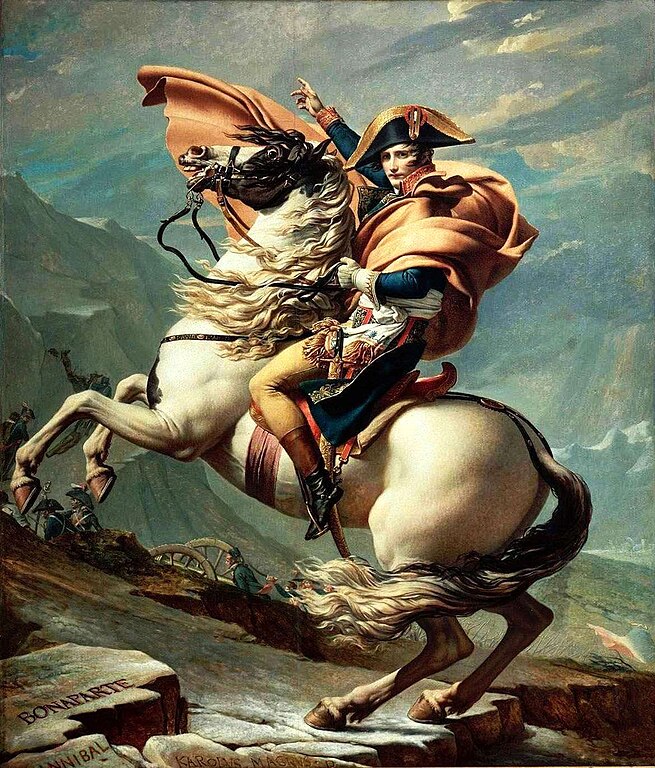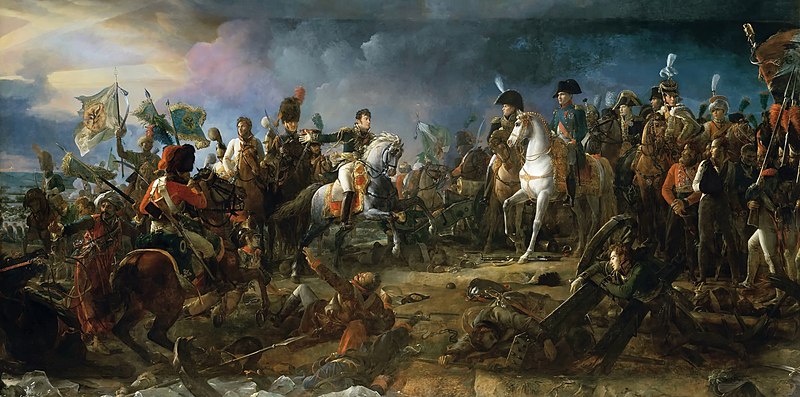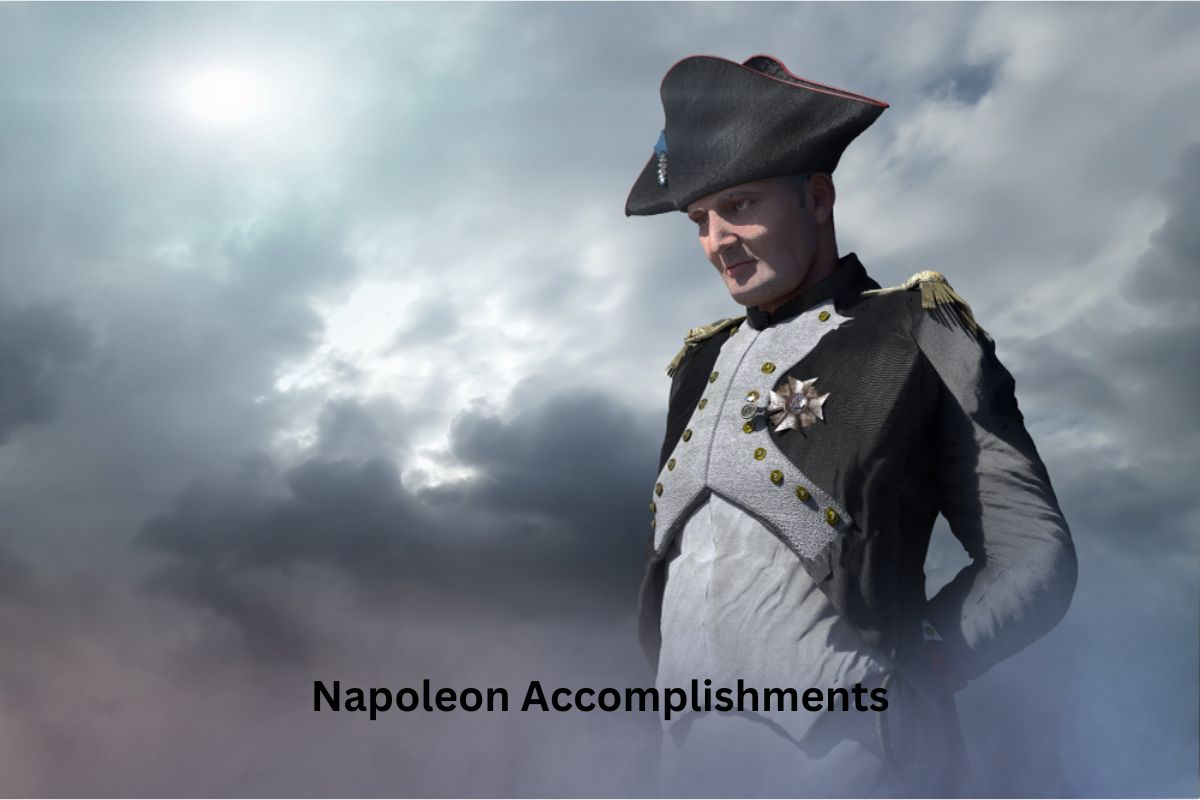Napoleon Bonaparte, a towering figure in history, left an indelible mark on the world through his multifaceted accomplishments. Rising from a military background, he reshaped governance, law, and society in revolutionary ways.
His legacy encompasses military triumphs, legal reforms like the Napoleonic Code, administrative innovations, and cultural contributions, each of which reflects his strategic vision for a transformed Europe.
However, his actions also ignited both admiration and controversy, a testament to the complexity of his enduring impact.
Accomplishments of Napoleon Bonaparte
1. Military genius and victories
Napoleon’s military prowess and strategic brilliance were evident throughout his career. He rose through the ranks during the French Revolution and eventually became a general.
His innovative tactics, such as the use of artillery and rapid maneuvering, allowed him to achieve remarkable victories on the battlefield.
Also Read: Napoleon Timeline
These successes included famous battles like Marengo, Austerlitz, and Jena-Auerstedt. Napoleon’s military genius enabled him to establish dominance over much of Europe and expand his empire.

2. Napoleonic Code
One of Napoleon’s enduring legacies is the Napoleonic Code, also known as the Civil Code of 1804. This legal framework revolutionized legal systems by introducing clear and comprehensive laws that were accessible to the public.
Also Read: Timeline of the Napoleonic Wars
The code emphasized equality before the law, protection of property rights, and individual rights such as freedom of religion. It replaced the complex and often contradictory legal systems that existed before, providing a foundation for modern civil law in many countries around the world.
3. Centralized administration reforms
Napoleon’s administrative reforms aimed to streamline governance and bring efficiency to his vast empire. He divided regions into departments, each headed by a prefect appointed by the central government.
This centralized structure ensured better communication and implementation of policies. It also reduced corruption and favored meritocracy over birthright in administrative appointments. By standardizing laws, taxation, and administrative procedures, Napoleon sought to create a more unified and organized state apparatus.
4. Concordat of 1801 with the Pope
In an effort to reconcile the relationship between the French government and the Catholic Church, Napoleon negotiated the Concordat of 1801. This agreement with Pope Pius VII aimed to stabilize the religious situation in France after the upheavals of the French Revolution.
The Concordat reestablished the Catholic Church as the dominant religion in France while also recognizing religious freedom for other faiths. It allowed the French government to have some influence over the appointment of clergy, ensuring a balance between state control and religious authority.
5. Expansion of education (lycées)
Recognizing the importance of education for the development of a modern society, Napoleon established a system of lycées, or secondary schools. These lycées offered a standardized curriculum with a focus on science, mathematics, humanities, and languages.
The aim was to provide a well-rounded education to produce skilled professionals and administrators for the state. This emphasis on education also contributed to the spread of knowledge and culture across his empire, fostering intellectual growth.

6. Infrastructure development
Napoleon understood the importance of efficient transportation and communication networks for maintaining control over his vast empire. He initiated significant infrastructure projects, including the construction of roads, bridges, canals, and harbors.
These improvements not only facilitated the movement of troops and goods but also promoted economic development. The well-maintained roads and canals allowed for quicker travel and trade, boosting commerce and connecting distant regions within the empire.
7. Creation of the Legion of Honor
Napoleon established the Legion of Honor (Légion d’honneur) in 1802 as a prestigious order of merit. This order was designed to recognize and reward individuals for exceptional achievements and contributions to France.
It aimed to promote loyalty, honor, and excellence across various fields, including the military, arts, sciences, and public service. The Legion of Honor became a symbol of recognition and elevated the status of those who received it, fostering a sense of pride and dedication to the nation.
8. Economic stabilization reforms
Napoleon recognized the importance of a stable economy to support his military campaigns and empire-building efforts. He introduced economic reforms to strengthen the financial system.
Notably, he established the Bank of France in 1800, which helped regulate the money supply, stabilize the currency (the franc), and provide funding for government projects.
These reforms played a crucial role in stabilizing the French economy after the tumultuous years of the Revolution.

9. Victory at the Battle of Austerlitz
The Battle of Austerlitz, fought in 1805 against the combined forces of Austria and Russia, is considered one of Napoleon’s greatest military triumphs. His strategic brilliance and use of terrain allowed him to defeat a numerically superior enemy.
The victory solidified his dominance in Europe and bolstered his reputation as an exceptional military commander. The battle is often referred to as the “Battle of the Three Emperors,” as Napoleon faced both the Russian Emperor Alexander I and the Holy Roman Emperor Francis II of Austria.
10. Patronage of art and culture
Napoleon had a significant impact on the art and culture of his time. His conquests brought about the repatriation of valuable artworks, sculptures, and cultural artifacts to France.
He supported the establishment of the Louvre Museum as a showcase for these treasures, making art more accessible to the public. Napoleon also contributed to the revival of interest in classical art and architecture, inspiring the “Empire style” characterized by grandeur, symmetry, and classical motifs.
These accomplishments showcase Napoleon’s diverse influence on society, from recognizing excellence and fostering national pride to implementing economic reforms and promoting cultural achievements. However, it’s important to remember that Napoleon’s legacy is complex, as his actions also led to conflicts, upheaval, and both positive and negative repercussions throughout Europe.
